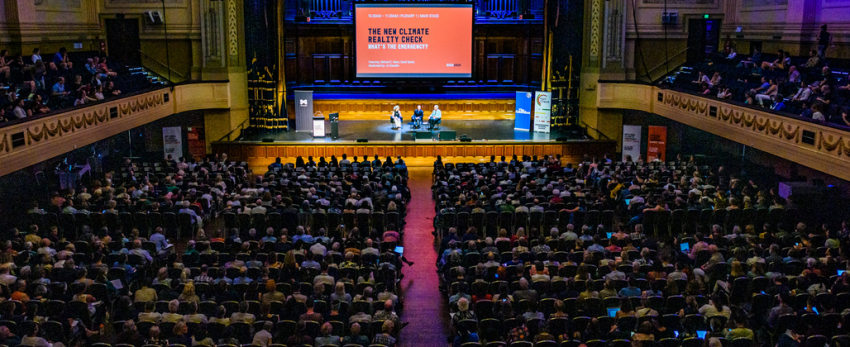
The 2020 National Climate Emergency Summit, at Melbourne Town Hall over February 14–15, featured more than 100 speakers and attracted about 800-1000 attendees each day.
While many radicals attended, they were largely excluded from plenaries and breakouts. There was no input from unionists, ecosocialists or ecoanarchists, who are part of the larger climate justice movement, and very little discussion of just transitions.
The summit was largely aimed at pushing state governments to declare climate emergencies and shift from fossil fuels to renewable energy sources. The ACT and some 87 local governments, including Darebin, Melbourne and Sydney, have already done this.
Moderators and presenters largely comprised high-profile individuals, starting with opening addresses by Melbourne Lord Mayor Sally Capp and new Australian Greens leader Adam Bandt.
While the event had numerous sponsors and partners, including the City of Melbourne and RMIT, its main drivers were the think tank Breakthrough and the Sustainable Living Festival.
Bandt argued: “We face an existential crisis. A four-degree world would support a billion people, even less. Government and industry worked together in World War II. Nothing will stop the clean energy revolution."
Bandt said he would introduce a climate emergency declaration bill in federal parliament. “We want to move Australia into a Green New Deal and make it an energy superpower and address social inequality.”
In a plenary titled “New climate reality check”, author Michael Mann, based at Penn State University in the United States, argued that an emphasis on climate adaptation, rather than climate mitigation, “avoids talking about real solutions”. He alluded to the need for systemic changes, although he did not spell out what they might be.
Climate Code Red co-author David Spratt argued that, despite the intensity of the climate crisis, the world has the economic resources to solve it with appropriate actions.
Former Labor shadow minister for climate change Peter Garrett insisted that a “national government can be an instrument for change”, while Independent MP for Warringah Zali Steggall said she would introduce a private member’s bill to “act on climate change”.
High school student climate activist Jean Hinchliffe, who attended the 2019 UN climate change conference in New York, and Paul Gilding, a long-time proponent of the war mobilisation framework on climate action, rounded out the second plenary, which was framed around leadership.
Nyadol Nyuon, an African-Australian woman who presented on the “Justice and rights” panel, said millions of climate refugees are likely to seek sanctuary in Australia. World Vision spokesperson Tim Costello observed that although Australia has recently become the poster child for climate change, its first victims are the poor and South Pacific Islanders.
The plenary “Democracy reboot: Politics fit for the emergency challenge”, moderated by Kerry O’Brien, included former Liberal leader John Hewson, who argued ex-PM Tony Abbott had inflicted a lot of damage on climate politics and that Australia could export renewable and hydrogen energy, as economist Ross Garnaut argues in Superpower.
Garrett asserted that history will judge former Labor PM Julia Gillard kindly, in part because the carbon price mechanism brought emissions down. Steggall argued climate change is not a left/right issue, even though there are more climate denialists in the Coalition.
The breakout session with the most radical observations was “Climate mobilisation — politics in America”. Visiting US psychologist and author of Facing the Climate Emergency: How to Transform Yourself with Climate Truth Margaret Klein Salamon argued for the need to break corporate power.
She said US presidential candidate Bernie Sanders is currently the most popular politician and that many young Americans are anti-capitalist. She lamented, however, that the Green New Deal proposed by Sanders and Democratic congressperson Alexandria Ocasio-Cortez does not address fossil fuels.
Former Greens leader Christine Milne observed that Green parties are doing well in Germany and Ireland, but expressed concern about the Austrian Green Party’s alliance with the Islamophobic Austrian People’s Party.
A session on “Crisis on country: First Nations responses to the emergency” heard from First Nations activists Lidia Thorpe, Jacqui Katona and Neil Morris.
A session on “Building the business coalition: Getting business on board” featured former coal industry executive Ian Dunlop, former Greenpeace director Paul Gilding, Beyond Zero Emissions’ business and industry liaison Heidi Lee and Simon Holmes à Court.
It illustrated the summit’s failure to acknowledge that global capitalism, and not just the fossil-fuel industry, is the primary driver of anthropogenic climate change, with its focus on profit-making and economic growth.
A declaration supporting the shift from fossil fuels to renewable energy, a non-partisan effort to solve the climate crisis, engagement with the business community and mobilisation of civil society to adopt the climate emergency strategy was passed.
[Hans A Baer is a Senior Honorary Research Fellow in the School of Social Political Sciences at the University of Melbourne.]